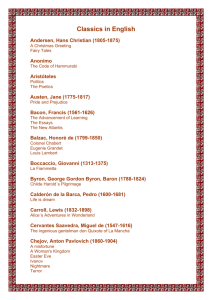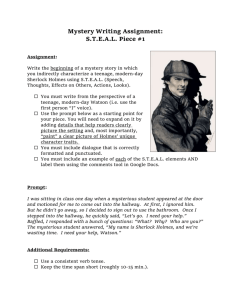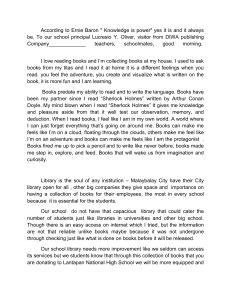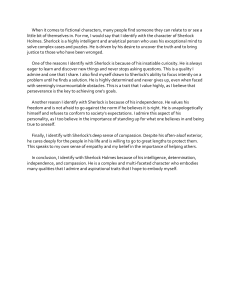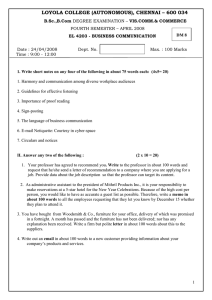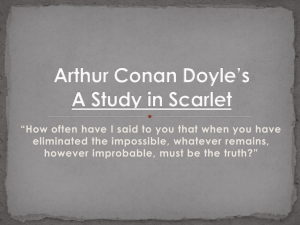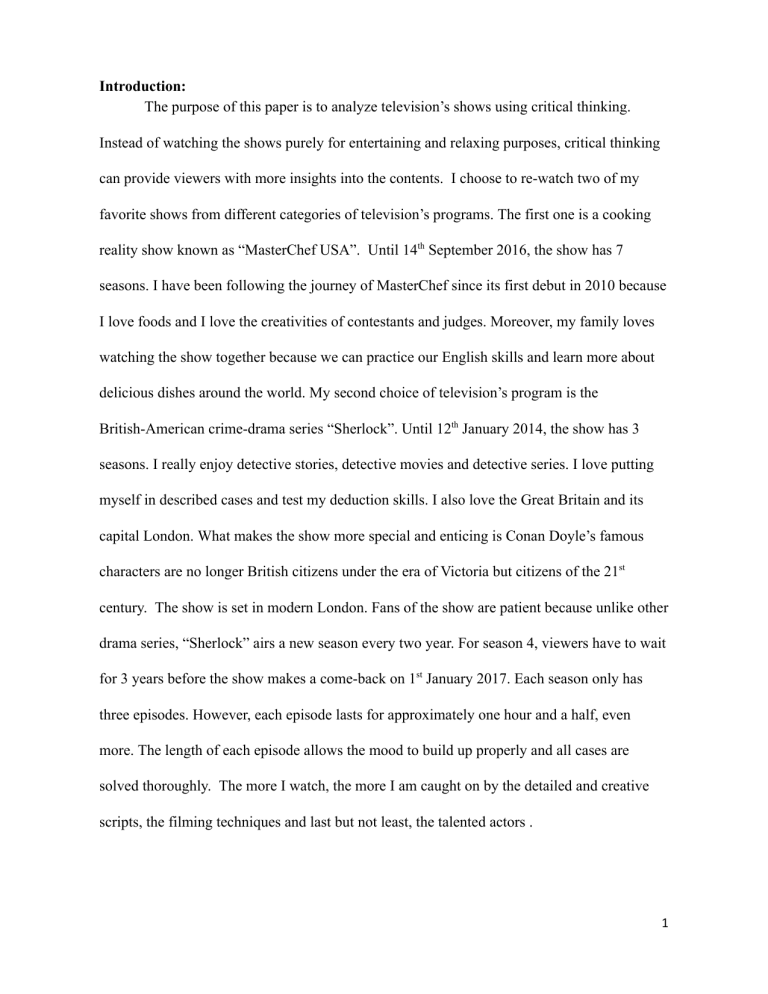
Introduction: The purpose of this paper is to analyze television’s shows using critical thinking. Instead of watching the shows purely for entertaining and relaxing purposes, critical thinking can provide viewers with more insights into the contents. I choose to re-watch two of my favorite shows from different categories of television’s programs. The first one is a cooking reality show known as “MasterChef USA”. Until 14th September 2016, the show has 7 seasons. I have been following the journey of MasterChef since its first debut in 2010 because I love foods and I love the creativities of contestants and judges. Moreover, my family loves watching the show together because we can practice our English skills and learn more about delicious dishes around the world. My second choice of television’s program is the British-American crime-drama series “Sherlock”. Until 12th January 2014, the show has 3 seasons. I really enjoy detective stories, detective movies and detective series. I love putting myself in described cases and test my deduction skills. I also love the Great Britain and its capital London. What makes the show more special and enticing is Conan Doyle’s famous characters are no longer British citizens under the era of Victoria but citizens of the 21st century. The show is set in modern London. Fans of the show are patient because unlike other drama series, “Sherlock” airs a new season every two year. For season 4, viewers have to wait for 3 years before the show makes a come-back on 1st January 2017. Each season only has three episodes. However, each episode lasts for approximately one hour and a half, even more. The length of each episode allows the mood to build up properly and all cases are solved thoroughly. The more I watch, the more I am caught on by the detailed and creative scripts, the filming techniques and last but not least, the talented actors . 1 Exercise 1: MasterChef USA is a cooking competition for homes’ cooks across the United State. The winner will take home $250,000 cash, his (or her) own cook book, “the most desired” MasterChef’s trophy and the title of “American Master Chef”. In the first 6 seasons, the judging panel is always consisted of 3 judges. In the 7th season, the panel is consisted of 2 main judges and guest judges. As the executive producer of the show, Gordon Ramsay is always one of the main judges. The guest judges are stars of the culinary world. They are not only there to judge the foods but they are also there to guide and share experiences with the contestants. Every season of the “MasterChef” Competition has 3 parts. The first part is the selection of top 20 from thousands of hopefuls. The second part repeats the orderly occurrence of four challenges: The “Mystery Box Challenge”, the “Elimination”, the “Team Challenge” and the “Pressure Test”. In the “Mystery Box Challenge”, the homes’ cooks do not know what they will have to cook with until they lift up the mystery boxes. The judges will observe and taste the readied components during this challenge. Then, they will take a closer look at three best dishes. The person with a winning dish will receive (an) advantage(s) in the “Elimination” round. The “Elimination” can be an eliminatory individual challenge, an eliminatory “Tact-team Challenge” or the eliminatory “Team-of-two challenge”. The following “Team challenge” is with different theme and is held at different locations every week. Two teams must design, prepare, cook and serve their menus according to the given requirements. The winning team will advance in the competition while the losing team will have to face the “Pressure Test”. The contestant who falls under the pressure and produce the worst outcome will be eliminated. The third part of the show is the Finale. The Finale is always a cook-off challenge between finalists. For the first six seasons, each Finale has two 2 finalists competing for the title. Season 7 is the first season to have three finalists in the battle ring. The main theme for the Finale is to prepare for the judges a three-course meal. The judges will consider each dish separately and they will also judge if the dishes success in composing a cohesive menu or not. There are many filming and editing effects that contribute to the success of the show. Firstly, MasterChef is a cooking reality show so the visual effect is vitally important. Viewers cannot hear all the cooking sounds. They also cannot taste or smell the foods. Therefore, visual effects provide viewers a chance to feel involved. The warmth, the saturation and the brightness in colors have been improved since season 4 by having more hues of redness. Red can stimulate the feeling of hunger1. Therefore, dishes look more delicious whenever the camera films them close-up. Also, cameras always film closely at ingredients, the process of preparation, and also elements of dishes. This filming technique provides viewers with more insights to what ingredients contestants are working with, how they are organizing their station and how they are preparing components for their dishes. Second, one of the most important effects for MasterChef is Sound. Diegetic sounds are sounds that both the contestants and TV viewers can hear. This makes the show more realistic to viewers because they can listen to the frying sounds, oil’s sound, chopping sounds, etc. Diegetic sounds also consist of the dialogues between contestants and judges, and also the comments on the dishes from the judges and fellow competitors. As TV viewers, there are fewer things that we are allowed to hear comparing to the contestants because of time-constraint. However, it is crucial that we still can hear what they hear because we can learn some cooking tips from the experts. The most important non-diegetic sound is background music. It creates the mood of the show. 1 Taylor Delano, “The Psychology of Color”, Daily Infographic. 19 September 2012. Web. 1 November 2016. http://www.dailyinfographic.com/the-psychology-of-colors-infographic 3 In judging sessions, each contestant is presented with different background music. The sound is designed to suit the expectations and reviews of his or her dishes. The MasterChef competition can also build up tension for TV viewers through music. The show can also create tension through pause at climatic moment (like if the meat is cooked to the right temperature or not) and through commercial breaks at the decisive moment. Tensions are also created through worries and break-downs of the contestants, through judges’ angry comments, through judges’ actions when they are hot-headed, and the classic “I-do-not-know- it-is-hard to choose” sighing whenever a decision must be made. As a reality show, tension is the third most necessary component to hook the viewers. The fourth element is the personalities of judges. A television personality can make or break the show. Strong TV personalities can draw the attention of viewers while weak ones make viewers feel bored. Chef Gordon Ramsay has a strong TV personality. On television’s programs, he is famous for his short temper, his love of cooking and passion for his career. Other judges maybe not as much of a television personality like Chef Ramsay, but they and their TV personalities still attract a lot of viewers. Chef Eliot is young, cheerful and supportive in the kitchen but he can be very strict at certain points. Chef Bastianich is strict in evaluating dishes. One of his signature acts on MasterChef is dumping bad foods into the bin. Fans in many online discussions start to feel disappoint with the show when Chef Christina Tosi replaces Chef Bastianich as one of the main judges because she does not have a strong television personality. Cooks must create restaurant-quality dishes in order to advance in the competition. Therefore, basic knowledge and skills are must-to-have assesses for contestants. The more they know about cooking, the more they will excel. The show demands every home’s cook to have basic cooking techniques like knife skills, frying skills, etc. Homes’ cooks will be more 4 highly-evaluated if they know more intricate cooking skills like fuming, quick-freezing using nitrogen liquid, etc. Contestants also need the improvising skills in order to work with different ingredients from basic to unusual, from cheap to expensive, from canned to fresh, etc. All of them also need basic acknowledgement to the mix-and-match rules for ingredients. Contestants need creativity also because if they keep playing safe in the game, judges will consider that as a sign of them giving up. MasterChef requires contestants to have the will to learn, to build up their knowledge, senses and skills. The Art of Plating is one of the skills because according to judges and guest chefs: “You eat with your eyes first”. If dishes do not look appetizing then people cannot enjoy their food to the fullest. Last but not least, the cooks need to understand their ideas, their backgrounds, their hearts and desires. They must be attentive while making foods and make sure that every dish conveys how they feel, shows their personality and tells their stories. To me, the biggest reason for most viewers to find this show so appealing is the love for foods. For different people, that love is expressed in different ways like enjoy eating, enjoy preparing foods, love to discover new food or just feel satisfy with looking at videos and pictures of foods. Secondly, people prefer MasterChef Competition over other cooking competitions because of the judges. Apart from their television personalities, judges in the show are all successful and experienced chefs. I really love seeing whenever they cook with contestants because not only do they inspire the homes’ cooks, they also inspire me. Their professionalisms, skills and creativities are demonstrated once in a while. Those are opportunities for contestants and for viewers to observe and learn. Thirdly, MasterChef is a reality show so the audiences follow it to watch the competitive atmosphere between contestants. Viewers get to see contestants’ motivations, creativities and theirs demonstrations 5 of “putting yourself on the plate”. Dramas are also parts of MasterChef USA since most people enjoy watching them. In order to attract viewers, Hollywood’s producers create the stereotype for every American shows to have conflicts and dramas. Among the adults, this show can reinforce and develop attitudes toward families. In every season, the importance and influences of families are highlighted though visits of members from contestants’ families and judges’ families. Families are there to share loving memories which inspire the homes’ cooks to cook even better than they normally do. Apart from that, the show also develops the attitude towards foods consumption of certain people. The judges keep emphasizing that you must respect the ingredients you have on hand and do them justice. MasterChef sends a message that foods should not be thrown away when they are still in good use. The third attitude that adult viewers should reinforce is the positive and hopeful attitude towards life. MasterChef is an inspirational reality show because it encourages people to dream and to work hard to accomplish their dreams. MasterChef has winners who inspire not only the American, but also the world. There are the blind but talented Christine Ha, the persevering Luca Manfé and the “American Dream” seeker Claudia Sandoval. MasterChef also reinforces and develops the habits of cooking and thinking in advance for adults. By doing so, they can save money, control their sources of ingredients and exercise portion and nutrition control. The show also indicates that you should not be afraid of having your food tested because through constructive comments, whether they are compliments or critics, you can improve your culinary experiences. Moreover, adults are encouraged to practice the habit of being calm and collected in all situations. From the show, we can see that those who rush and hot headed when making food tend to produce less effectively. 6 For children, the first attitude that MasterChef reinforces and develops is the respect to foods. Cooking requires a lot of effort, love and care; therefore children should learn to appreciate their foods from a young age. The second attitude that children should develop is the perseverance with their dreams. This attitude can be reinforced even more if children watch MasterChef Junior because they will feel more related. In that version of the MasterChef reality show, contestants are all children from 8 to 13 years old. MasterChef also develops and reinforces good eating habits for children. They will be less craving for junk foods and fast foods if they see how delicious and appetizing real foods can be. Another habit is the willingness to help with the preparation or/and cooking process. They will spend less time in front of the screens. Through the show, they learn to appreciate the art of making foods and some will want to learn from the best cooks they know: their parents. The bad habit they may get from the show is using swearing words because Chef Ramsay is famous for swearing whenever he is frustrated – which he is for most of the time. Except from swearing, habits and attitudes that are developed through the show can help both adults and children with their daily life at home, at school and at work. Firstly, having the appreciative attitude towards their family is crucial for viewers because family is the foundation of who they are. Family is usually the endless source of unconditional love also. Secondly, having the treasuring attitude towards their foods will help adults economize. They will then learn to put their money in some other good use. Thirdly, thinking in advance is not only a useful habit in food decision but also in other decisions that need to be made in life. One simple example is driving: you need to have the map of actions in your head. Next, cooks need to share their food with others in order to have someone to taste and to give feedbacks. The habit of sharing their foods with others frees adults from their seclude shells 7 so that people can mingle and be more social. Also, the positive and hopeful attitude towards life encourages adults to live their life to the fullest and to do their best following their dream. It is harder for adults than it is for children because adults have responsibilities. But, they can still take small steps to achieve their goals. For children, to have dreams and to be perseverance with their dreams from young ages will shape the way they view the world. Positive attitudes will lead to positive actions and yield positive results in their future. With the appreciative attitude towards their foods, children will learn from young age that foods should not be wasted. They will appreciate family’s members, school’s cooks and restaurants’ chefs for cooking them the foods. A grateful personality will do them good in the future because the society highly values those who have grateful attitudes. Good eating habits will ensure children’ and adults’ health conditions. For children, it is beneficial to develop habit of asking to assist in the kitchen rather than playing games. They will learn from young age how to use their time effectively. They will also know how to cook for themselves. This crucial skill will benefit them in the future because sustaining a healthy eating habit in busy times are hard if one do not know how to prepare their own foods. I love watching the show because my Asian background only allows me to know about foods from Asian cuisines and fast foods from the Western countries. My knowledge about foods is broadened thanks to the show because contestants in MasterChef come from different cultures. Thanks to the up-close filming technique, I learn a lot about cooking and baking. There are things homes’ cooks have to learn through imagery demonstrations. To me, foods are the equilibrium of art and science because it requires emotional and physical devotions, precision, experiment, explorations and finest in seasonings, preparations, decorations. Base on my understanding of foods, I love how creative and talented the contestants and the judges. 8 I enjoy watching them make foods and listen to their comments on foods. Dramas in this show are fun to watch, but sometimes they get annoying to me because I can clearly see the television’s tricks to attract viewers. I would recommend the show to all of my acquaintances anyway. This show is satisfying, informative and interesting to watch. Foods lovers and cooks will definitely enjoy the show even more. I do think that this show be suitable for college classroom discussion. Debates about who should go home and who should not, who should win and who should not, whether judges’ personalities affect the show ratings or not, etc. Those are possible topics that we can discuss because a reality show can create a lot of agreements and disagreements – which keep it interesting to watch and to discuss. Exercise 3: The British-American television’s crime drama series “Sherlock” tell the contemporary version of the classic series “The Adventures of Sherlock Holmes” by Sir Arthur Conan Doyle. The original Holmes’s story is set in the Victorian period. The latest special episode called “The Abdominal Bride” is set in that era. Other episodes of “Sherlock” are set in the 21st century because the main plot revolves around a modern Sherlock. “Sherlock” is about a brilliant but annoying detective who solves mysteries in modern-day London. Sherlock Holmes used to work alone until John Watson becomes his partner. Holmes’s clients are varied from normal civilians to British royal members, from the haves to the have-nots. But Sherlock only cares about the contents of the cases. He only accepts those that interest him. Every episode tells a different mystery yet they always relate to each other. Jim Moriarty is the one who plans the connections between all those crimes. The battles of the brilliant minds of Sherlock Holmes and his archenemies Moriarty are the main wheels of the story line. 9 The show most favorably presents the “partners in crime”: Sherlock Holmes (plays by Bennedict Cumberbatch) and John Watson (plays by Martin Freeman). Other most recurring characters are the land-lady Mrs.Hudson, the Scotland Yard’s inspector Greg Lestrade, the pathologist Molly Hopper, Watson’s wife Mary Morstan (or Mary Watson), Holmes’ brother Mycroft Holmes and Jim Moriarty- Holmes’ archenemies. In this version, Sherlock Holmes is a genius but annoying private detective while Doctor John Watson is an ex-soldier who comes back from Afghanistan and. Through introductions, Watson becomes Holmes’s flat-mate. Apart from doing his duties as a doctor, Watson assists Holmes with his cases. He also retells Holmes’s stories on his blog. Sherlock reluctantly becomes an Internet’s sensation thanks to the tales. The Sherlock Holmes of the 21st century is described to have “a brain of a scientist or a philosopher yet he elects to be a detective” (Mycroft Holmes’s line in episode 1, season 2). The private detective solves mysteries in modern-day London with his exceptional observation skills, his brilliant deductions, his profound knowledge in subjects that he finds useful like physics, chemistry, studies of coding, etc. Sherlock Holmes tends to act on his own instincts without considering ethics and feelings of others. Therefore, Doctor Watson also plays the role as a “moral compass” for Sherlock (according to Martin Freeman). Sherlock does not “have friends, [he] only ha[s] one” (Sherlock’s line) and that is John Watson. However, Benedict’s Sherlock is different from other Sherlocks because apart from Watson, he cares for more people. Those persons are Lestrade, Molly Hopper and Mrs. Hudson. Sherlock’s relationship with his brother-Mycroft is also better in “Sherlock” than in other versions. Mutual cares between the brothers are expressed and stated through their dialogues, their supportive but sometimes secretive actions. They even have family reunions on special occasions like Christmas. Bennedict’s modern Sherlock is similar to the Sherlock that Robert 10 Downey Jr. portrayed in the two “Sherlock Holmes” movies. Both Sherlocks show that “the heartless bastard[s]” (lines from movies and the series) have hearts and they can heterosexually feel loves, feel grieves. However, those feelings are always towards the only woman of the character Sherlock’s admiration: Miss Irene Adler. Benedict’s Sherlock refers to her as “THE Woman”- the only woman who melts his icy heart. Apart from John Watson, The Woman is the only one to whom Sherlock Holmes lowers his guards for. She only appears in one episode of “Sherlock” (episode 1, season 2: A Scandal in Belgravia) but her influences on Sherlock occasionally show in later episodes. Jim Moriarty is Sherlock’s arch nemesis. He is the one who webs the net of mysteries, problems, terrors and innocents’ deaths. He is as smart as Holmes but he uses his exceptional intellects for more wicked purposes. Sherlock acknowledges him as a match but no matter how Sherlock Holmes respects Jim’s intelligence, either Sherlock or Jim must die while the other “staying alive” (Moriarty’s signature ringtone). A primary theme of a crime drama show is different cases and how the main leads solve them. Therefore, the drama “Sherlock” focuses mostly on conflicts. Every human has the curious nature to peek and to unveil secrets. The original story of Sherlock Holmes is already full of conflicts due to its nature as a detective series. When producers decide to turn the story into a modern crime drama series, conflicts are developed even more to hook viewers. There are conflicts between Sherlock Holmes and Scotland Yard’s officers. Inspectors and officers at Scotland Yard dislike Holmes because of his arrogance, his over-confidence. They are also afraid of him because if he decides to use his brilliance against the law, it is nearly impossible to stop the ingenious mad criminal Sherlock Holmes. However, they still ask for his assistances and his consultants time after time. There are conflicts between Sherlock Homes 11 and John Watson. Sometimes, Holmes can be so annoying and manipulating that Watson cannot enjoy his life as a free man, a boyfriend, a married man. Holmes’s actions are sometimes base on pure instinct and have no consideration of morality or ethic. On the contrary, Watson is the man who thinks of others before he acts. Sometimes, there are conflicts between the crime scene’s evidences and the realities. For example, in episode 3 of season 2, the kidnapped children insist that Sherlock is the culprit but he is actually not. “Sherlock” also illustrates some conflicts in Sherlock’s actions and his thoughts, especially whenever he is desperate. For example, in episode 1 of season 2, Sherlock predicts that the woman is dead because she gives him a mobile phone which she emphasizes “her life depends on that”. On Christmas day, he actually sees a beaten up body with her name and her exact measurements. He believes that she is dead and he is in grief. He says that he do not care but his actions of skipping meals, refusing to sleep, composing sad music and saying nothing betrays him. Generally, those are actions most people with broken heart will take. The show also animated a social problem: you are always in conflict with the world around you. Our first instinct when we meet someone is to evaluate them and to judge them. No matter who we are and how we are living our lives, there are always haters and enviers in because they compare out achievements with theirs. There are two violent cases that imprint most heavily in my mind. The cruelest social violence to me is the mind-game Jim Moriarty sets up for Sherlock Holmes in season 1, episode 3 known as “The Great Game”. The stake is someone will die if Sherlock fails to solve a challenge. The messengers are forced to wear a vest full of explosives. Hostages are innocent women, men, children and John Watson himself. In limited amounts of time, mental violence is applied to Sherlock Holmes because he is forced to solve difficult challenges. In 12 one of the challenges, an old woman is killed even though Sherlock has successfully solved the problem. The reason is because she describes the voice of the mastermind behind the scene: Jim Moriarty. Since Moriarty doesn’t like to be exposed so early, he initiates the bombs she is wearing. The blast kills her and 12 people in total. To me, the second most dramatic violence is caused to Doctor John Watson in season 3, episode 1 known as “The Empty Hearse”. John Watson is mad at Sherlock Holmes for pretending to be dead in two years without giving John any signal. When John comes to Baker Street to talk with Sherlock, he is violently attacked, drugged and kidnapped. John is then trapped in the middle of the fagot, which is covered with gasoline and ready to be burnt on “Guy Fawkes Night”. The fagot is already caught on fire when Sherlock runs to rescue John from being burnt alive in the bonfire. For John, he suffers from mental trauma for a few days after this violent event. The mind-game with people’s lives at stake is one of the serious violences that affect the plot. The mind-game is an introduction of Jim Moriarty’s capabilities to Sherlock Holmes. Those scenes let viewers see how cruel, ruthless and insane Jim Moriarty can be. While Moriarty and Sherlock both possess brilliant brains, they stand on two sides of the barrels. Sherlock uses his brain to assist the side of justice. In contrast, Jim Moriarty benefits from his brain by inflecting terrors. Recognizes Sherlock as his equals, Moriarty’s warning to Sherlock is to stop prying into his business or else he “will burn the heart out of [Sherlock]”. From the mind game, the “Sherlock” series sets an equal fight between two similarly talented individuals. The bonfire also affects the plot in season 3 of the series and even in the upcoming seasons. The bonfire is actually a test from Charles Angustus Magnussens to see if John Watson is really Sherlock Holmes’s weakness. Magnussen is a guy who collects all data about important persons. He uses theirs sensitive and private data to black mail them in order 13 to get what he wants. Magnussens reviews that his goal is to acquire the governmental data that Mycroft Holmes has. In order to legally get the data, he needs Sherlock. Having a weakness is a proof that Sherlock Holmes can be manipulated. Sherlock has to accept Magnussens’s deal in order to trade for John’s contentment with his life. At the end of that episode, Sherlock shoots Magnussens to free everyone from Magnussens’s influences. Sherlock is free from trial but instead, he is called to enter a highly dangerous mission in Eastern Europe as punishment. But when a loop of Jim Moriarty asking “Did you miss me?” is broadcasted all over England, Sherlock is summoned back. Being called back while his flight has already taken off means that Sherlock Holmes is highly valued by the government. With the prospect of chaos to come, he is England’s only hope to combat against Moriarty’s chosen successor. This is an essential point for the plot in the upcoming season 4. Different people and principles are betrayed during the course of the show. First, having Sherlock Holmes attending crime scenes is already illegal actions of Scotland Yard’s officers and detectives, especially Lestrade. They betray the principle of having no extra person in order to have Sherlock’s assistance. They need him because Sherlock solves mysteries faster and he still gives all the credits to Scotland Yard. The second “betrayal” in “Sherlock” is how rational thinkers betray their common principle: “caring is a weakness”. Sherlock Holmes encounters “The Women” Irene Adler in a case. She is the first woman who is brilliant enough for him to remember, to have sentimental feelings of a lover, and to respect. For him, Irene Adler is “THE Woman”. Because of her, he unintentionally destroys a national plan in just eight seconds and almost causes the royal’s family to succumb to Adler’s conditions. As for Irene Adler, she is known as the dominatrix who provides sexual pleasures only. She makes enemies and keeps their weakness as data for her protection. Irene Adler could win the 14 protection by the British government if she wasn’t manipulated by her love for Sherlock. She betrays her mind and her instinct to survive by setting a password describing her feelings. The password is SHER in order to create the phrase “I AM SHERLOCKED”. The decision costs her the game. The third betrayal is between John Watson and Sherlock Holmes. John considers it is a betrayal on Sherlock’s side for not including him in Sherlock’s plan of faking his death and living under cover (episode 3, season 2). His death makes John suffer and grieve for two years (Christmas’s special, episode 3, season 2 and episode 1, season 3). They are supposed to be life partners so being shut out makes John feel betrayed and hurt. The fourth betrayal that I notice is caused by Mary. She lies to John about herself ever since the first day they met. She does not tell him the truth about her true identity and her past as an assassin for CIA. When Sherlock has John listens to the truth, John is deeply hurt. The only thing Mary does not fake is her feelings for John. She decides to win his trust back after betraying it by providing him a hard-drive in which contains all information about her. Sherlock Holmes is known for acting without caring about consequences but the only time he betrays the national security law is in episode 3 of season 3. He steals his brother’s laptop to give it to Magnussens to trade for Mary’s past evidences. At first, it is Sherlock’s plan to get into Magnussens’s archive of secret data. He wants have Magnussens caught by Mycroft’s government forces but in the end, his plan backfires. Firstly, the show encourages the values of useful knowledge. Sherlock compares his brain to a hard-drive which can store a vast amount of data. However, hard-drives have limits. We have to make space for important information. Therefore, different people should perceive and store knowledge that is useful in their specific situations only. Secondly, the show encourages critical thinking through the use of observations, prior knowledge and 15 experiences. Critical thinkers are forced to realize their own limits and be honest with themselves. In episode 1 of season 2, Sherlock refers to that as “know when you are beaten”. After having more insights into who we are, the next step is to gain more insights to the situations. Reasonable deductions from critical thinking are what we need to live our life more productively and purposefully. Third, the show features people forcing Holmes to stop smoking. “Sherlock” sends the message that smoking should be avoided because it is bad for one’s physical and mental health. Forth, the show emphasizes the importance of friendships. People should not live selfishly in their own bubbles. We are encouraged to be social, make friends, cherish and protect our friends. For example: Sherlock has more “friends” in this TV series. They will be shot if Sherlock does not suicide (episode 3, season 2) so Sherlock decides to jump off the rooftop. And I have never seen an adaptation of Sherlock Holmes where Holmes has a gathering dinner with his friends on Chrismas day. More importantly, he plays them cheerful music. Lastly, the show highlights family’s values. Again, I have never seen anywhere else that Sherlock Holmes and his brother Mycroft share caring moments with or express worries for each other. Nor have I seen or read of the Holmes family reunion anywhere else. I agree with all the attitudes and values the show encourages because those are what we need to know, to comprehend and to apply in daily life. I really love the show “Sherlock” or as fans of “Sherlock” prefer to say: I am Sherlocked. Steven Moffat and Mark Gatiss are doing an amazing job with the idea of bringing Sherlock Holmes to the 21st century where he has all the technologies to help him solving cases more effectively. Along with brilliant deductions and sarcasms of the 21st century’s Sherlock, allusions to the original work of Sir Arthur Conan Doyle are also used which make fans of the original story loves the show more and more. So far, the show only has 3 seasons and 2 16 special episodes. However, the plot is brilliant. The dramas are there to satisfy the curiosities of viewers. The moral lessons are incorporated so naturally that the show does not give a feeling of lecturing its viewers of how to live their lives. The cases and the deduction processes are enticing. The outcome of each case is convincingly solved. All of those elements make up an exciting drama series that fans cannot stop watching. Season 4 will be aired on January 1, 2017 after years of postponing and fans of the show are all anxiously anticipating. One of my friends recommended the show to me and I will definitely recommend it to all the people I know. In my belief, dramas, detective stories and criminal analysis excite humans. Therefore, I think everyone who watches the show will love it. Yes, this show will be suitable for college classroom discussion. Aspects of the series can be discussed in various classes that require critical and analytical thinking such as Cinema, English, Knowledge, etc. 17 Conclusion: After having watched the shows and applied my critical thinking, there are a few things that I clearly realize for the first time. I noticed the occurrence of dramatizing elements in MasterChef USA before but I wasn’t aware of how they actually reflect the Hollywood industry. Conflicts and dramas are money-making elements for producers in making television shows and any other type of entertaining productions. Therefore, every episode must have conflicts and dramas to increase the rating and watching rates. The newer and the more unconventional the dramas and conflicts are, the more successful of the show. Now, I can actually understand why I prefer Master chef over other cooking competitions, such as “Hell’s kitchen”. “MasterChef USA” is full of dramas but the contestants’ abilities and creativities are highlighted more. Therefore, the dramas are not as overwhelming as in “Hell’s kitchen”. They are just sufficient enough to make the show interesting. I also notice how editing elements can make a reality show more appealing to viewers. After watching latest seasons of MasterChef USA, I find the first three seasons less attractive because the colors are dull and camera’s quality wasn’t as good as it is now. More importantly, I didn’t realize how much cooking and baking knowledge I have gained from the show until I reflect on it. As for “Sherlock”, using my knowledge from Cinema’s class to analyze the series gives me more insights to the show. Fans of “Sherlock” are patiently waiting for the show partly because each episode has the same duration of a movie. The time length allows the content of each episode to fully develop. This makes each case more appealing and interesting for the viewers. Cinematic elements are used too attentively and smoothly that viewers actually forget they are watching a television drama show. “Sherlock” is a creative adaptation of “The Adventures of Sherlock Holmes” because there are similarities in characters, in names of the 18 episodes, in descriptions of cases. After this project, I can relate the show to other productions of Sherlock more easily. Moreover, moral components are in show but I couldn’t voice them out clearly until I think critically about them. Now, I can understand more messages that directors and writers convey in the show. That makes me realize what elements make up a good television drama for me. Not only to satisfy human’s cravings for thrilling moments but also a good drama needs to encourage and develop some aspects of knowledge, ethnicity, and morality. As a fan of both “MasterChef USA” and “Sherlock”, I love the shows even more after thinking more deeply about them for this project. But I do not think that I can watch television programs and movies like I used to. After this Fall’s semester, my knowledge in cinema and more importantly, in analytical skills are improved. New knowledge and critical thinking provides me with more insights, helps I see more clearly and understand problems more thoroughly. It also changes my habits of being passively receiving information in life. 19
